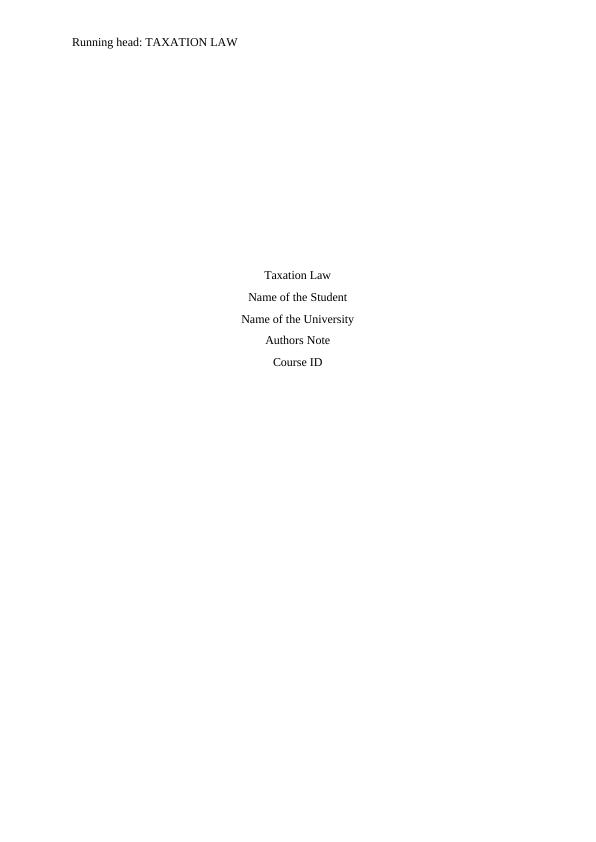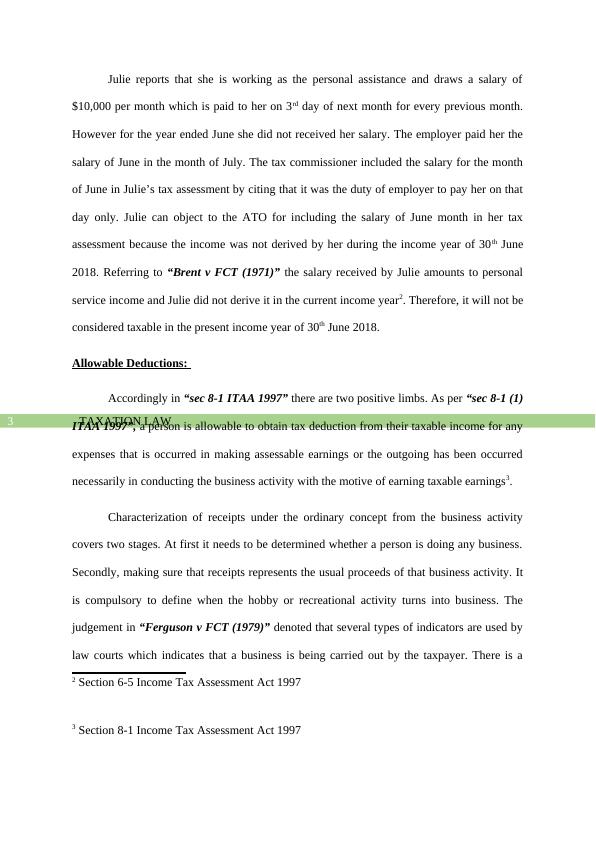Case Studies of Income Tax Law
Added on 2022-07-27
14 Pages2903 Words25 Views
Running head: TAXATION LAW
Taxation Law
Name of the Student
Name of the University
Authors Note
Course ID
Taxation Law
Name of the Student
Name of the University
Authors Note
Course ID

TAXATION LAW1
Table of Contents
Part B..........................................................................................................................................2
References:...............................................................................................................................12
Table of Contents
Part B..........................................................................................................................................2
References:...............................................................................................................................12

TAXATION LAW2
Part B
memo
123 Accounting Pty Ltd
To: Douglas Parks
From: <student name>
Date: <insert date>
Re: Objection to 2018 Notice of Amended Assessment for Julie Banks
Assessable Income:
The explanation given in “sec 6-5 ITAA 1997” describes that if a person is a resident
then they will be held taxable for types of income that they have earned either from the direct
sources or indirect sources both in and out of Australia in the income year. In order to include
the income in the taxpayer assessable income for a particular year, it should be derived by
that taxpayer during that year only1. Derivation of income comprises of two important aspects
namely identifying the taxpayer that is deriving the income and timing of the income
derivation by the taxpayer. It involves the income year in which it must be included for tax
purpose.
The cash basis is largely used by the individual such as those that are earning salary or
wages. As noted in “Brent v FCT (1971)” salary and wages are considered derived when it is
received i.e. it is considered taxable on cash basis. The income that a taxpayer earns from
providing any personal service then it is considered taxable on receipt basis.
1 Brent v Federal Commissioner of Taxation - [1971] HCA 48
Part B
memo
123 Accounting Pty Ltd
To: Douglas Parks
From: <student name>
Date: <insert date>
Re: Objection to 2018 Notice of Amended Assessment for Julie Banks
Assessable Income:
The explanation given in “sec 6-5 ITAA 1997” describes that if a person is a resident
then they will be held taxable for types of income that they have earned either from the direct
sources or indirect sources both in and out of Australia in the income year. In order to include
the income in the taxpayer assessable income for a particular year, it should be derived by
that taxpayer during that year only1. Derivation of income comprises of two important aspects
namely identifying the taxpayer that is deriving the income and timing of the income
derivation by the taxpayer. It involves the income year in which it must be included for tax
purpose.
The cash basis is largely used by the individual such as those that are earning salary or
wages. As noted in “Brent v FCT (1971)” salary and wages are considered derived when it is
received i.e. it is considered taxable on cash basis. The income that a taxpayer earns from
providing any personal service then it is considered taxable on receipt basis.
1 Brent v Federal Commissioner of Taxation - [1971] HCA 48

TAXATION LAW3
Julie reports that she is working as the personal assistance and draws a salary of
$10,000 per month which is paid to her on 3rd day of next month for every previous month.
However for the year ended June she did not received her salary. The employer paid her the
salary of June in the month of July. The tax commissioner included the salary for the month
of June in Julie’s tax assessment by citing that it was the duty of employer to pay her on that
day only. Julie can object to the ATO for including the salary of June month in her tax
assessment because the income was not derived by her during the income year of 30th June
2018. Referring to “Brent v FCT (1971)” the salary received by Julie amounts to personal
service income and Julie did not derive it in the current income year2. Therefore, it will not be
considered taxable in the present income year of 30th June 2018.
Allowable Deductions:
Accordingly in “sec 8-1 ITAA 1997” there are two positive limbs. As per “sec 8-1 (1)
ITAA 1997”, a person is allowable to obtain tax deduction from their taxable income for any
expenses that is occurred in making assessable earnings or the outgoing has been occurred
necessarily in conducting the business activity with the motive of earning taxable earnings3.
Characterization of receipts under the ordinary concept from the business activity
covers two stages. At first it needs to be determined whether a person is doing any business.
Secondly, making sure that receipts represents the usual proceeds of that business activity. It
is compulsory to define when the hobby or recreational activity turns into business. The
judgement in “Ferguson v FCT (1979)” denoted that several types of indicators are used by
law courts which indicates that a business is being carried out by the taxpayer. There is a
2 Section 6-5 Income Tax Assessment Act 1997
3 Section 8-1 Income Tax Assessment Act 1997
Julie reports that she is working as the personal assistance and draws a salary of
$10,000 per month which is paid to her on 3rd day of next month for every previous month.
However for the year ended June she did not received her salary. The employer paid her the
salary of June in the month of July. The tax commissioner included the salary for the month
of June in Julie’s tax assessment by citing that it was the duty of employer to pay her on that
day only. Julie can object to the ATO for including the salary of June month in her tax
assessment because the income was not derived by her during the income year of 30th June
2018. Referring to “Brent v FCT (1971)” the salary received by Julie amounts to personal
service income and Julie did not derive it in the current income year2. Therefore, it will not be
considered taxable in the present income year of 30th June 2018.
Allowable Deductions:
Accordingly in “sec 8-1 ITAA 1997” there are two positive limbs. As per “sec 8-1 (1)
ITAA 1997”, a person is allowable to obtain tax deduction from their taxable income for any
expenses that is occurred in making assessable earnings or the outgoing has been occurred
necessarily in conducting the business activity with the motive of earning taxable earnings3.
Characterization of receipts under the ordinary concept from the business activity
covers two stages. At first it needs to be determined whether a person is doing any business.
Secondly, making sure that receipts represents the usual proceeds of that business activity. It
is compulsory to define when the hobby or recreational activity turns into business. The
judgement in “Ferguson v FCT (1979)” denoted that several types of indicators are used by
law courts which indicates that a business is being carried out by the taxpayer. There is a
2 Section 6-5 Income Tax Assessment Act 1997
3 Section 8-1 Income Tax Assessment Act 1997

End of preview
Want to access all the pages? Upload your documents or become a member.
Related Documents
Taxation Law | Report | Case Studylg...
|11
|2610
|18
Taxation Law | Assignment 2lg...
|10
|2829
|14
Taxation Law Assessable Earnings Report 2022lg...
|12
|2725
|30
Taxation Law: Understanding Personal Service Income and Fringe Benefitslg...
|9
|2034
|311
Taxation Law: Determining Taxable Income, Assessable Income, and Tax Consequenceslg...
|12
|2264
|348
Taxation Lawws Case Study 2022lg...
|14
|3058
|11